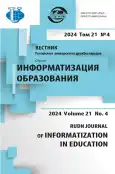Artificial intelligence in higher education: problems, opportunities, risks
- Authors: Gasanova R.R.1, Romanova E.A.1
-
Affiliations:
- Lomonosov Moscow State University
- Issue: Vol 21, No 4 (2024)
- Pages: 501-515
- Section: PEDAGOGY AND DIDACTICS IN INFORMATIZATION
- URL: https://journal-vniispk.ru/2312-8631/article/view/321361
- DOI: https://doi.org/10.22363/2312-8631-2024-21-4-501-515
- EDN: https://elibrary.ru/SLOHPH
- ID: 321361
Cite item
Full Text
Abstract
Problem statement. The unprecedented pace of development and application of artificial intelligence in higher education attracts the academic staff of scientists to analyze and discuss the problem of opportunities, risks and boundaries of the use of artificial intelligence (AI) in the organization of higher education. The purpose of the study is to analyze the integration of AI into the educational processes of higher education as a strategy for using digital technologies, indicated by accelerating the achievement of educational transformation goals in the activity sphere, where opportunities are found for teaching, learning, and scientific activities of the teacher and students. Methodology . Analytical and theoretical research methods (literature analysis, data synthesis, generalization, induction, deduction, establishment of cause-and-effect relationships) were applied to assess the current state of the educational sphere regarding the widespread introduction of AI capabilities, and an express survey was conducted in the number of 105 people: students of additional education programs “Teacher” and “Teacher of a higher educational institution” on the topic of psychological adaptation to the active use of AI technologies in the framework of pedagogical practice. Results. There are opportunities to optimize the learning process using AI, such as assessing the level of knowledge of students according to predetermined criteria, organizing and conducting tests and exams, ability to get rid of routine work, translating and voicing any text. Conclusion. It is summarized that the most promising direction for application of AI technologies in higher education is an additional education, which is organized primarily for acquisition of specific knowledge and skills by reducing the time spent searching for literature, scientific reviews, setting specific tasks and problems, organizing communication, etc.
About the authors
Renata R. Gasanova
Lomonosov Moscow State University
Author for correspondence.
Email: renata_g@bk.ru
ORCID iD: 0000-0002-4641-0019
SPIN-code: 4256-8644
ResearcherId: AAM-9027-2020
Candidate of Psychological Sciences, Senior Lecturer at the Department of Educational Systems Management, Faculty of Pedagogical Education
1 Leninskie Gory, Moscow, 119991, Russian FederationEkaterina A. Romanova
Lomonosov Moscow State University
Email: romanovaea@my.msu.ru
ORCID iD: 0000-0003-1006-0499
SPIN-code: 5599-9043
Candidate of Psychological Sciences, Associate Professor, Associate Professor at the Department of History and Philosophy of Education, Faculty of Pedagogical Education
1 Leninskie Gory, Moscow, 119991, Russian FederationReferences
- Vladimirov IV, Wang P, Zhao W, Gasanova RR. Content analysis of university development strategies in China within the framework of the concepts of “University 4.0” and “educational ecosystem”. Informatics and Education. 2024;39(1):84–95. (In Russ.) https://doi.org/10.32517/0234-0453-2024-39-1-84-95
- Sharabov M, Tsochev G. The use of artificial intelligence in industry 4.0. Problems of Engineering Cybernetics and Robotics. 2020;73:17–29.
- Kapustina LV, Ermakova YuD, Kalyuzhnaya TV. ChatGPT and education: eternal confrontation or possible cooperation? Concept. 2023;10:119–132. (In Russ.)
- Lapina MA, Tokmakova ME, Demin DA, Yesayan GA. Features of the introduction of artificial intelligence in the educational process. Auditorium. 2023;3(39):48–53. (In Russ.)
- Li Baohong, Romanova EA. Digital competence of university students as a factor in optimizing teaching Russian as a foreign language. Moscow University Bulletin. Series 20: Education. 2022;2:29–37. (In Russ.)
- Ivanchenko IS. Assessment of prospects for the use of artificial intelligence in the higher education system. Science for Education Today. 2023;13(4):170–194. (In Russ.) http://dx.doi.org/10.15293/2658-6762.2304.08
- Ivakhnenko EN, Nikolsky VS. ChatGPT in higher education and science: a threat or a valuable resource? Higher Education in Russia. 2023;32(4):9–22. (In Russ.) https://doi.org/10.31992/0869-3617-2023-32-4-9-22
- Konstantinova LV, Vorozhikhin VV, Petrov AM, Titova ES, Shtykhno DA. Generative artificial intelligence in education: discussions and forecasts. Open Education. 2023;27(2):36–48. (In Russ.) https://doi.org/10.21686/1818-4243-2023-2-36-48
- Sysoev PV, Filatov EM. ChatGPT in students’ research work: to forbid or to teach? Tambov University Review. Series: Humanities. 2023;28(2):276–301. https://doi.org/10.20310/1810-0201-2023-28-2-276-301
- Garkusha NS, Gorodova YuS. Pedagogical opportunities of ChatGPT for developing cognitive activity of students. Vocational Education and Labor Market. 2023;11(1):6–23. (In Russ.) https://doi.org/10.52944/PORT.2023.52.1.001
- Lukichev PM, Chekmarev OP. Application of artificial intelligence in the higher education system. Russian Journal of Innovation Economics. 2023;13(1):485–502. (In Russ.) https://doi.org/10.18334/vinec.13.1.117223
- Rezaev AV, Tregubova ND. ChatGPT and AI in the universities: an introduction to the near future. Higher Education in Russia. 2023;32(6):19–37. (In Russ.) https://doi.org/10.31992/0869-3617-2023-32-6-19-37
- Zashikhina IM. Scientific article writing: will ChatGPT help? Higher Education in Russia. 2023;32(8-9):24–47. (In Russ.) https://doi.org/10.31992/0869-3617-2023-32-8-9-24-47
- Romanova EA, Gasanova RR. Managing the information and educational environment of an educational institution under the influence of digitalization: monography. Moscow: MAKS Press; 2022. (In Russ.) https://doi.org/10.29003/m3053.978-5-317-06862-2
Supplementary files









